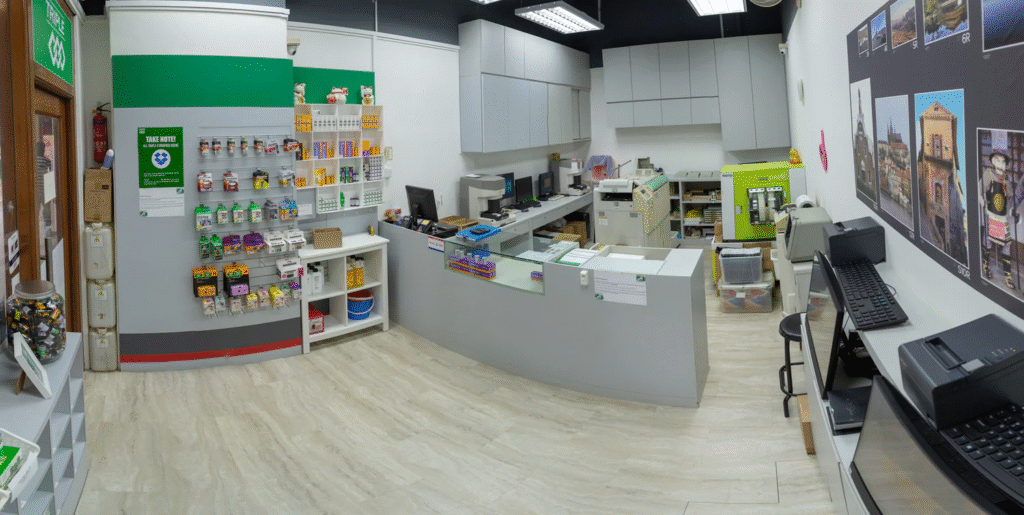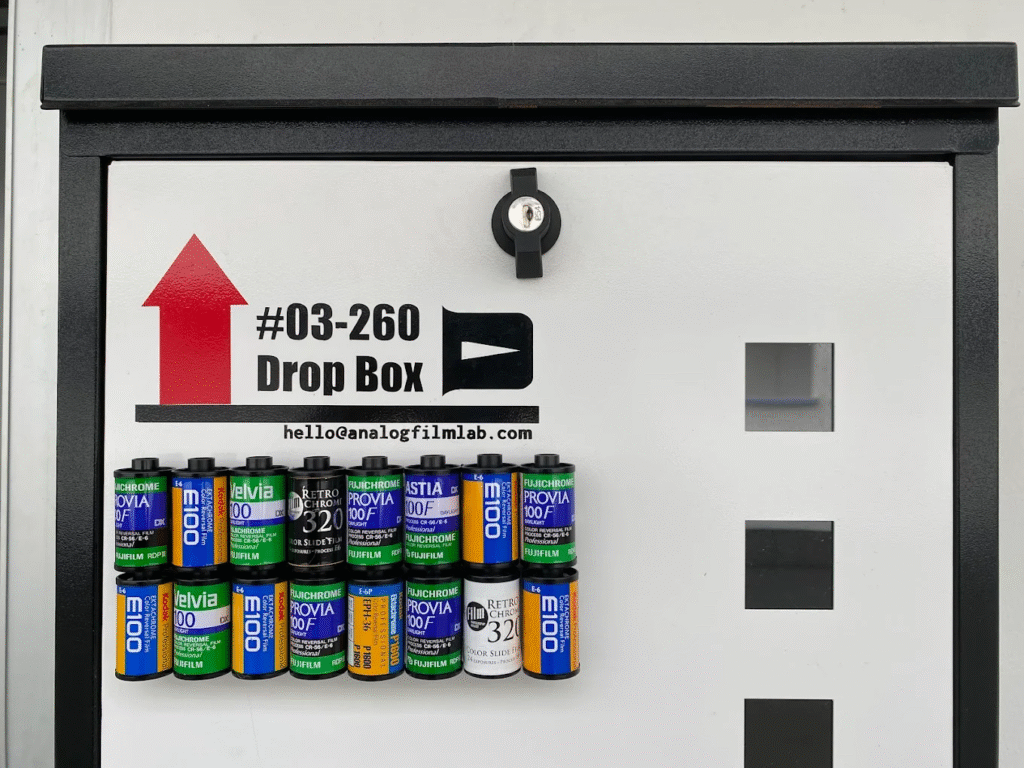Analog is alive and well in Singapore. From heritage camera dens at Peninsula to indie labs in Bugis and Balestier, the city has a surprisingly deep ecosystem for film shooters. Whether you’re hunting for your first point-and-shoot, dropping a roll for same-day scans, or booking drum-quality files for a portfolio print, this guide rounds up the best film photography stores and labs in Singapore—what each is great for, how to visit, and tips to make your rolls look their best.
Where to buy film, cameras and essentials
8storeytree (online + community pop-ups)

A stalwart of the local scene since the 2000s, 8storeytree is both an online shop and a community anchor that stocks Kodak, Ilford, Fujifilm, Polaroid, RETO and more. They’re also the authorised distributor of MiNT instant products for Singapore and Malaysia. If you’re new to film, their blog posts and social updates are a handy way to keep up with labs, events and stock alerts. Start your shopping online, and watch their socials for in-person activations and Objectifs tie-ins.
Address: 2 Jln Rajah, #01-02 Entrance by Back Door, Singapore 329134
Ruby Photo (Peninsula Shopping Centre / City Hall)

A heritage name for generations of shooters, Ruby Photo at Peninsula carries film stocks, darkroom odds and ends, and accessories in the City Hall area. Expect a no-nonsense setup and old-school service—the kind of counter you can lean on while you chat about film speeds and chemistry. It’s easy to combine a visit here with other Peninsula camera stops in the same complex.
Address: 3 Coleman St, B1-20, Singapore 179804
The Camera Workshop (Peninsula Shopping Centre / City Hall)

If your film body needs some TLC, The Camera Workshop (TCW) is one of the most trusted addresses for servicing and repairs, alongside a rotating selection of used film bodies and lenses. Hours are typically Monday–Saturday, mid-day to early evening—call ahead if you’re coming with a specific issue.
Address: 3 Coleman St, #01-06 Peninsula Excelsior Hotel/Shopping Centre, Singapore 179804
Where to develop and scan your film
Whampoa Colour Centre (Balestier)

“Old but gold” is the most common refrain you’ll hear about WCC. Around since the early 1980s, the lab is a favourite for friendly counter service, brisk turnarounds and consistently clean scans. It’s a great first lab for new shooters because prices are transparent and the team is happy to talk you through options. Expect C-41 and B&W, with hours that favour a daytime drop and late-day pickup.
Address: 272 Balestier Rd, Singapore 329723
Triple D Minilab Centre (Burlington Square / Bugis)

Convenience is the big draw at Triple D—near Bugis MRT with same-day developing and scanning if you beat the 2pm cut-off. They run Noritsu processing and HS-1800 scanning with online orders available; you’ll also find a good selection of films at the counter if you want to reload on the spot. It’s popular, but the staff keep the queue moving.
Address: 175 Bencoolen St, #01-07 Burlington Square, Singapore 189649
Shalom Colorlab (Bras Basah Complex)

Tucked inside the creatives’ haunt of Bras Basah Complex, Shalom offers C-41, B&W and niche formats, plus helpful counter advice. If you’re digitising family archives or need passport photos and printing, they can do that too. Opening hours run most days with a mid-day to early-evening window; check their site for the latest timetable before you go.
Address: 231 Bain St, #01-77, Complex 180231
Analog Film Lab (Ubi)

If you’re particular about colour and grain, Analog Film Lab is worth the trip. They process E-6 slide, C-41 and B&W, and are known for high-quality Fuji Frontier SP-3000 scans, traditional silver-gelatin darkroom prints, and even darkroom rental. Mail-in service is streamlined: submit the order form, pack your rolls and post them to the Ubi address; you’ll get a queue update online. It’s a great option for exhibition-quality work or personal projects where file quality matters.
Address: 3015 Ubi Rd 1, #03-260, Singapore 408704
Hands On Film (Bali Lane / Bugis)

A friendly indie studio, Hands On Film manually handles each roll and keeps prices beginner-friendly. There’s a 24/7 drop box, daily opening hours, and a vibe that makes first-timers feel welcome. If you like pairing a film errand with a coffee, its Kampong Gelam location is perfect for a photo walk before you drop off the roll.
Address: 21 Bali Ln, #02-01, Singapore 189857
FotoHub (multiple malls)

For shooters who want convenience above all, FotoHub’s island-wide retail network offers film services alongside their mainstream printing counters. Turnarounds can vary by outlet, but for suburban access near your MRT (NEX, Westgate, Raffles City, Forum and others), it’s a handy option.
Choosing the right lab for your needs
If you shoot a roll here and there and want speed, Triple D’s same-day service is hard to beat. If you value face-to-face advice and a steady hand that’s seen it all, Whampoa Colour Centre and Shalom Colorlab are both reliable and welcoming. If image quality is the priority—especially for slide film, large files or printmaking—Analog Film Lab’s Frontier scans and darkroom services stand out. And if you’re starting out or prefer a laid-back, community vibe with easy drop-offs, Hands On Film is a smart first stop.
Planning your visit: hours, locations and little details
Peninsula Shopping Centre is still Singapore’s densest cluster for film shooters, with Ruby Photo for stocks and The Camera Workshop for repairs and used gear, all a short walk from City Hall MRT. Allocate time to browse: you’ll often find unexpected straps, filters and old-stock film in display cases. Over in Bugis, pair Triple D or Hands On Film with a Kampong Gelam photo walk; both areas offer plenty of colour and texture for street shooting. In Balestier, a WCC drop pairs nicely with a hawker stop, and in Ubi, Analog Film Lab’s mail-in model means you can ship rolls from anywhere without crossing town.
Turnaround times and prices change, so treat the figures you see online as a starting point and check the lab’s latest posts before you go. Triple D lists operating hours and drop-box details on their site; Analog Film Lab posts a live process queue; Shalom keeps timings updated on its contact page. A quick check saves a wasted trip—and helps you plan when to shoot your next roll.
What to buy now: film and accessories that make sense in Singapore
Given Singapore’s bright, humid conditions, ISO-200 and 400 colour stocks are versatile for daytime streets and parks, while 800-speed is a lifesaver for night markets and hawker centres. Pick up a few rolls of Kodak Gold 200 or ColorPlus 200 for sunny afternoons, Ilford HP5 for classic B&W, and an 800-speed stock for evenings. Keep a couple of reloadable point-and-shoots or a compact SLR in your bag; humidity means you should also budget for a dry cabinet if you plan to keep gear long-term. Peninsula shops often carry affordable dry boxes, and labs like Analog Film Lab and WCC will happily talk storage if you ask.
Getting better scans (and fewer headaches)
Good scans start with good exposure. Meter for the shadows on colour negative film to keep tones rich; for slide film, err on the side of precision because latitude is tighter. When you book scans, ask for resolution details rather than just “basic” or “premium.” Labs that disclose their scanners and file specs—such as Frontier SP-3000 or Noritsu HS-1800—make it easier to compare apples to apples. Analog Film Lab publishes its Frontier workflow, while Triple D details Noritsu processing and HS-1800 scans; both produce excellent colour in experienced hands. If you’re printing large, request TIFFs or “pro” scans; for social sharing, JPEGs at a moderate size are fine.
A simple first-timer workflow
Plan a photo walk around Kampong Gelam or the Civic District, shoot a single roll of ISO-200/400 during daylight hours, and avoid constantly switching film stocks while you’re learning. Drop the roll at Hands On Film or Triple D for standard scans and ask the counter for their preferred exposure tip. When the files come back, pick 3–5 favourites to lightly edit for contrast and colour balance—small, global tweaks keep the film look intact. If you like the results, shoot the same stock again before changing variables. Repetition is how you learn what a film does in Singapore’s light and humidity.
Good-to-know: closures, pop-ups and the regional option
Stores come and go, and some brands now serve the region rather than Singapore specifically. FilmNeverDie, for example, currently anchors in Melbourne and runs services in Malaysia; their Singapore presence has largely shifted to events and collaborations rather than a permanent storefront. If you see them popping up locally, it’s usually via partner venues or festival tie-ins—fun for community energy but not a primary day-to-day lab option.
The magic of shooting film in Singapore is how easy it is to fold into everyday life. You can buy a roll at Peninsula, shoot an hour along the river, then drop your canister at Bugis or Balestier and get clean scans by evening. For more serious projects, the city has labs that treat your negatives like artworks, with Frontier-grade files and silver-gelatin prints. Start simple, learn your stock, and build relationships with your preferred counter—the best part of the film revival here isn’t just the colours or the grain, but the people behind the scanners and shelves keeping it alive.
Leave a Reply